
Welcome from our CEO
Welcome to As You Sow’s new and improved newsletter! In this issue, we detail our most recent successes and look ahead to 2012. Read about our newest Board Member, Carl Pope, and our “No Fracking Way” event coming up October 25th. Catch up on our work with Procter & Gamble and General Mills, how fracking companies like Exxon and Chevron are continuing to create risk for shareholders, and much more. You can find links to all of these articles in the sidebar to the left.
Thank you for your support.
Best,


Andrew Behar, CEO
Carl Pope Joins As You Sow Board of Directors
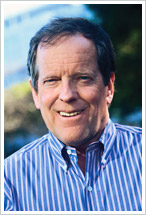 We are pleased to announce the addition of Carl Pope to the As You Sow Board of Directors. Mr. Pope is widely known for his 20-plus year tenure as the Executive Director of the Sierra Club and also for his role as co-author of The Safe Water and Toxic Enforcement Act of 1986, the landmark toxics labeling statute known as Proposition 65. As You Sow has been a prominent public enforcer of that statute for nearly 20 years.
We are pleased to announce the addition of Carl Pope to the As You Sow Board of Directors. Mr. Pope is widely known for his 20-plus year tenure as the Executive Director of the Sierra Club and also for his role as co-author of The Safe Water and Toxic Enforcement Act of 1986, the landmark toxics labeling statute known as Proposition 65. As You Sow has been a prominent public enforcer of that statute for nearly 20 years.
“We are thrilled to welcome someone of Carl’s caliber to our Board,” said Larry Fahn, President. “Having worked with him for 20 years in various capacities at the Sierra Club, I know that Carl is a brilliant strategist, a prolific fundraiser, and an outstanding manager. All of these talents will serve him well on the As You Sow Board of Directors.”
“As You Sow has been doing pioneering work in shareholder advocacy and environmental health for nearly two decades and I look forward to helping them reach a higher level of impact,” says Pope. “Their ability to create change in corporate policy and action through dialogue, shareholder advocacy, and environmental enforcement is unparalleled.”
Mr. Pope currently serves as Chairman of the Sierra Club and on the Board of the Apollo Alliance. He graduated summa cum laude from Harvard College and spent two years with the Peace Corps in India helping communities and families address the human and environmental impacts of population growth.
“Carl brings strategic sophistication and a broad network of leaders in business, politics, and science that will assist us in our work,” said As You Sow CEO, Andrew Behar. “His presence on the board will allow us to build capacity and create industry-wide movements, furthering our mission of environmental and social corporate responsibility.”
Progress on Packaging Waste
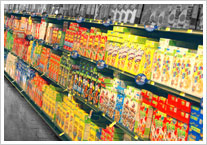
Product packaging needs to be re-thought to produce zero waste.
As You Sow is pleased to report progress in both beverage container recycling and consumer packaged goods. After two years of engagement with Starbucks, we have decided not to re-file a shareholder resolution in 2012 due to their commitment to recycle all in-store paper cups by 2015. We will now shift our focus to urge McDonald’s and Yum! Brands to match Starbucks’ cup commitments with the goal of increased volume of cups recycled and to help create industry-wide change.
As we announced this spring, As You Sow’s newest program presses consumer products companies to take responsibility for post-consumer packaging waste, with the added goals of reducing packaging and eliminating ocean debris. Our work with consumer packaged goods (CPG) companies is based on the principle of Extended Producer Responsibility (EPR), which shifts accountability from taxpayers and government to producers. EPR programs in Canada and 27 European countries has diverted millions of tons of plastic, metal, glass and paper away from landfills into recycling streams.
To reach these goals in the U.S., we have expanded our work with beverage and electronics companies to the consumer packaged goods and grocery sectors. Earlier this year, we filed two landmark shareholder resolutions with Procter & Gamble and General Mills. These were the first ever filed on EPR and, as such, received substantial attention. Through the summer, Senior Program Director Conrad MacKerron met with both Procter & Gamble and General Mills, and negotiated a withdrawal of our proposals in exchange for detailed assessments of their views on EPR and continued good faith engagement.
In 2012, we look forward to continuing these dialogues and beginning new ones with Kraft Foods, Unilever, and grocery companies such as Kroger, Safeway, Supervalu, Whole Foods, and Walmart.
Image: Flickr/PawPaw67
“No Fracking Way!”
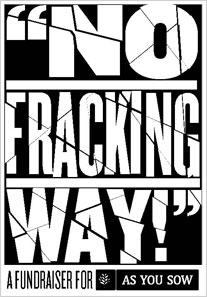 As You Sow will be hosting a fracking fundraiser in Los Angeles on October 25th and you’re invited! We will focus on the toxic threat that hydraulic fracturing poses to communities across the country—including Los Angeles.
As You Sow will be hosting a fracking fundraiser in Los Angeles on October 25th and you’re invited! We will focus on the toxic threat that hydraulic fracturing poses to communities across the country—including Los Angeles.
The event will be held in a private loft on the boardwalk of Venice from 5:00 to 8:00pm. Josh Fox, Oscar-nominated writer/director of “Gasland,” will make a special Skype appearance to discuss his upcoming sequel.
Hydraulic fracturing, or “fracking,” is a way to extract natural gas by drilling a deep well and injecting large quantities of chemically infused water into the earth. Much of the water reemerges carrying toxic chemicals into the surrounding air and water.
Santa Barbara and Baldwin Hills are already victims of fracking: both communities have reported subsequent health problems and damage to their homes.
Uzbek Cotton Kicked Out of Fashion Week
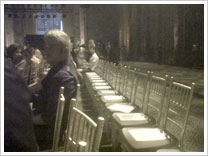
Empty chairs at the Gulnara Karimova fashion show.
This fall, the Responsible Sourcing Network (a project of As You Sow) attended New York Fashion Week to make sure cotton produced with child labor in Uzbekistan stayed off the runways. RSN’s pledge against forced child labor in Uzbekistan received public support from over 60 of the world’s largest apparel manufacturers, brands, retailers, and an apparel and footwear associations including Gucci, H&M, and Walmart.
Displaying a historic level of industry activity on this issue, signatories pledged“firm opposition to the use of forced child labor in the harvest of Uzbek cotton. We commit to not knowingly source Uzbek cotton for the manufacturing of any of our products until the Government of Uzbekistan ends the practice of forced child labor in its cotton sector.”
Starting with an article in Women’s Wear Daily, the company pledge and its signatories were mentioned by prominent outlets covering the event. It was also noted in a debate on corporate governance and accountability in the House of Lords, the Upper House of the Parliament of the United Kingdom.
The pledge gave legitimacy to the protests around the “Guli” fashion show of Gulnara Karimova, daughter of the President of Uzbekistan, whose show was eventually cancelled by Fashion Week organizers thanks to pressure by human rights activists. The canceled show propelled coverage in national and international media outlets, society pages, and even gossip columns. Overall, coverage reached diverse and impressive readership in the United States and overseas giving the campaign against ongoing forced child labor in Uzbekistan a new life beyond Fashion Week.
Looking ahead, RSN will be working with a coalition of 80+ apparel brands to implement cotton traceability systems throughout their supply chains, in addition to developing media outreach and an educational campaign for 2012.
Investor Concern for Fracking Risk Grows
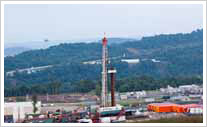
Fracking releases known toxins into air and water across the U.S.
In the past year, The New York Times, the Wall Street Journal, Reuters, and the documentary “Gasland” have focused a national spotlight on the human and environmental health dangers of the controversial drilling technique, commonly known as “fracking.” Investors are paying attention.
In the 2011 proxy season, investors clearly voiced their concern about the controversial drilling practice to companies like ExxonMobil, Chevron, and Ultra Petroleum. As You Sow’s resolutions asking those companies for transparency around fracking policies and safety saw an increase in support from shareholders. At Ultra Petroleum, the support doubled to 42% and a first-time resolution at oil and gas giant Chevron received an astounding 41% of investors’ votes. As a typical environmental resolution would only expect about 7%, these vote results demonstrate the real concern of individual and mainstream institutional investors.
“These are really extraordinary votes,” said Senior Strategist Michael Passoff. “It took the shareholder campaign on climate change more than a decade to achieve this level of support.”
As You Sow and a coalition of NGO’s are currently conducting dialogues with several companies engaged in fracking to discuss key performance indicators to ensure the health and safety of the communities where the drilling is occurring. Notably, one company disclosed that a reduction in the amount of toxic chemicals in their fracking fluids improved their bottom line.
In the 2012 proxy season, we will be re-filing with these oil and gas giants to prevent fracking from damaging the health of communities across the United States.
As You Sow Supports Student Shareholder Advocates
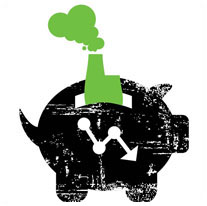 University endowments are major investors with over $400 billion in assets. Many schools have signed pledges for carbon neutrality, some have closed coal-fired plants that power their campuses, and others have vowed to end the university’s reliance on coal entirely. However, endowments with investments in coal-fired utilities are not aligned with their core values and sustainability commitments. Due to the excessive financial risks facing coal-fired utilities, they are also making a very poor economic investment choice (read more about this in “White Paper: Financial Risks of Investments in Coal”).
University endowments are major investors with over $400 billion in assets. Many schools have signed pledges for carbon neutrality, some have closed coal-fired plants that power their campuses, and others have vowed to end the university’s reliance on coal entirely. However, endowments with investments in coal-fired utilities are not aligned with their core values and sustainability commitments. Due to the excessive financial risks facing coal-fired utilities, they are also making a very poor economic investment choice (read more about this in “White Paper: Financial Risks of Investments in Coal”).
In order to focus the power of university endowments on these coal-fired utilities, As You Sow and a coalition of partner organizations is working to enable student shareholder advocates to press their endowments trustees to push utilities for a rapid transition to clean energy or to divest.
This program began with the development of an educational platform for students and alumni to demystify how university endowments function and how to press university trustees to disclose the holdings with full transparency. The students then educate their endowment committee members on the financial risks of coal investments, and press trustees to exert their influence on coal companies.
Currently, students at University of North Carolina Chapel Hill and University of Illinois Urbana- Champaign are working to align the values that their schools teach with their investments. By leveraging the power of these endowments, utility executives and boards of directors will be forced to consider the concerns over coal risk as they make critical decisions about the future of powering America.
Framework for the Use of Nanomaterials in Food

Nanomaterials in food improve taste and color but pose unknown risks.
Following McDonald’s commitment to a “No Nano” policy, As You Sow plans to release a framework for companies in the food industry to use when deciding whether or not to source food products or food packaging containing nanomaterials. As there are currently no regulatory requirements or widely-available safety data on using this technology in food, the framework provides companies with step-by-step recommendations for examining the risks of using nanotechnology in their food products.
‘Nanomaterials’ are particles that have been manipulated at the molecular, or nano, level, which is one billionth of a meter—so small that it can pass through human membranes. The food industry is exploring the use of this technology to add nutritional benefits, flavoring, and coloring to food products and antibacterial ingredients to food packaging. But nanomaterials’ small size gives the material unique properties, which raises concerns about dangers for human health and the environmental.
As food companies begin to use nanotechnology, transparency is crucial to preserve the health of their consumers and the company reputation. Uncertainty around the safety and regulation of nanomaterials, coupled with a lack of transparency adds up to unnecessary risks for the consumers, workers, companies, and investors.
As You Sow’s framework is a resource for companies considering the use of nanomaterials. The framework includes an introduction of key terms and issues, the current state of regulations, and recommendations on the information companies should request and receive from suppliers offering products containing nanomaterials based on best practices from current scientific, industry, and governmental frameworks.
Source: nanogloss.com
Shareholder Advocacy in 2012
 As we continue to engage in dialogues started in the 2011 proxy season, As You Sow is gearing up for 2012. Our Energy, Environmental Health, and Waste Programs will be filing shareholder resolutions on a range of issues to protect human health and the environment.
As we continue to engage in dialogues started in the 2011 proxy season, As You Sow is gearing up for 2012. Our Energy, Environmental Health, and Waste Programs will be filing shareholder resolutions on a range of issues to protect human health and the environment.
Our Energy Program, with issue areas Coal and Fracking, will continue to press companies to transition away from dirty energy production. We will re-file with Duke and FirstEnergy, the largest coal utilities in the U.S., and file with new companies to speed up the transition to cleaner alternatives. We will also maintain pressure on major oil and gas companies ExxonMobil, Chevron, and Ultra Petroleum to acknowledge and respond to the growing concerns around the toxic chemicals in fracking fluid, the degradation of air and water, and the impact on local communities.
The Waste Program will expand to include the consumer packaged goods and grocery sectors, working for adoption of Extended Producer Responsibility (EPR). In beverage container recycling, we will be filing with Dr Pepper Snapple Group on bottle/can recycling goals and, after a successful dialogue with Starbucks, will engage with McDonald’s and Yum! Brands, owner of Taco Bell and KFC, to follow suit.
The Environmental Health Program will continue filing shareholder resolutions to eliminate the reproductive toxicant BPA, which is used in the plastic linings of every Coca-Cola can and also coats ATM receipts used by Bank of America and other banks across the nation. Our “Framework for Sourcing Food and Food Packaging Products Containing Nanomaterials” will be published to serve as a resource for companies in the food industry to follow McDonald’s lead in declaring a “No Nano” policy.
Our 8th annual “Proxy Preview” will be released in February and will offer comprehensive information on over 300 environmental, social, and governance shareholder resolutions filed by As You Sow and other advocacy groups.
We look forward to a busy year in 2012, using shareholder advocacy to promote social and environmental corporate responsibility.












 We are pleased to announce the addition of Carl Pope to the As You Sow Board of Directors. Mr. Pope is widely known for his 20-plus year tenure as the Executive Director of the Sierra Club and also for his role as co-author of The Safe Water and Toxic Enforcement Act of 1986, the landmark toxics labeling statute known as Proposition 65. As You Sow has been a prominent public enforcer of that statute for nearly 20 years.
We are pleased to announce the addition of Carl Pope to the As You Sow Board of Directors. Mr. Pope is widely known for his 20-plus year tenure as the Executive Director of the Sierra Club and also for his role as co-author of The Safe Water and Toxic Enforcement Act of 1986, the landmark toxics labeling statute known as Proposition 65. As You Sow has been a prominent public enforcer of that statute for nearly 20 years. 
 As You Sow will be hosting a fracking fundraiser in Los Angeles on October 25th and you’re invited! We will focus on the toxic threat that hydraulic fracturing poses to communities across the country—including Los Angeles.
As You Sow will be hosting a fracking fundraiser in Los Angeles on October 25th and you’re invited! We will focus on the toxic threat that hydraulic fracturing poses to communities across the country—including Los Angeles.

 University endowments are major investors with over $400 billion in assets. Many schools have signed pledges for carbon neutrality, some have closed coal-fired plants that power their campuses, and others have vowed to end the university’s reliance on coal entirely. However, endowments with investments in coal-fired utilities are not aligned with their core values and sustainability commitments. Due to the excessive financial risks facing coal-fired utilities, they are also making a very poor economic investment choice (read more about this in “White Paper: Financial Risks of Investments in Coal”).
University endowments are major investors with over $400 billion in assets. Many schools have signed pledges for carbon neutrality, some have closed coal-fired plants that power their campuses, and others have vowed to end the university’s reliance on coal entirely. However, endowments with investments in coal-fired utilities are not aligned with their core values and sustainability commitments. Due to the excessive financial risks facing coal-fired utilities, they are also making a very poor economic investment choice (read more about this in “White Paper: Financial Risks of Investments in Coal”).
 As we continue to engage in dialogues started in the 2011 proxy season, As You Sow is gearing up for 2012. Our Energy, Environmental Health, and Waste Programs will be filing shareholder resolutions on a range of issues to protect human health and the environment.
As we continue to engage in dialogues started in the 2011 proxy season, As You Sow is gearing up for 2012. Our Energy, Environmental Health, and Waste Programs will be filing shareholder resolutions on a range of issues to protect human health and the environment. 
